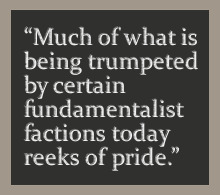Fundamentally Proud

Fundamentalism is a worthy cause. From its inception, it has endeavored to take a strong and clear stand on traditional Christianity. Beale defines a true fundamentalist as “one who desires to reach out in love and compassion to people, believes and defends the whole Bible as the absolute, inerrant, and authoritative Word of God, and stands committed to the doctrine and practice of holiness” (Beale 3). Fundamentalists take a literal approach to the Word of God. They are careful not to read any personal bias or opinion into the Bible. Recognizing that the heart is deceitful above all things, they understand the danger of allowing the feelings and knowledge of man to wield authority over the Scriptures. God’s truth weakened by man’s control ceases to be God’s truth.
It is for this reason the fundamentalist resists the liberal mindset so militantly. Liberal Christian thought seeks to marry theology to the corrupt humanistic thinking of the day. Colossians 2:8 strictly warns of the danger of being “spoiled through philosophy and vain deceit, after the tradition of men, after the rudiments of the world, and not after Christ.” Oil and water do not mix. The liberal theological attempt to mix the life-giving water of the Word with the slippery oil of the world has robbed mankind of the pure doctrine of the Scriptures that are able to save men’s souls. It has always been, and must continue to be, the mission of the fundamentalist to expose such error and guide men back to the authoritative Word of God.
 Dennis Walton, a contemporary critic, wrote:
Dennis Walton, a contemporary critic, wrote:
 Welcome to SI’s first Featured Discussion. On January 28, an important conversation about the future of fundamentalism began in response to Kevin Bauder’s “Nick of Time” essay, “
Welcome to SI’s first Featured Discussion. On January 28, an important conversation about the future of fundamentalism began in response to Kevin Bauder’s “Nick of Time” essay, “

Discussion